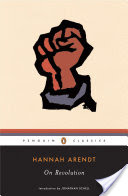On Revolution
 2006 edition | |
| Author | Hannah Arendt |
|---|---|
| Subject | Politics, revolution |
| Genre | Political theory |
| Publisher | Penguin Books |
Publication date | 1963 |
| Publication place | United States |
| Part of the Politics series |
| Republicanism |
|---|
|
|
On Revolution is a 1963 book by the political theorist Hannah Arendt, who presents a comparison of two of the main 18th-century revolutions: the American Revolution and the French Revolution, where they failed, where they succeeded and where they diverged from each other.
She views the American Revolution as more successful than the French Revolution, yet criticizes modern revolutionaries' tendency to model their actions on the latter. However, she also highlights that even the American Revolution fell short of its promise to provide public freedom and public happiness for everyone. With this she means the opportunity to partake in politics and the joy gained from shaping its own environment. She proposes council republics as a potentially superior revolutionary aim to achieve public participation and collective self-determination.
History
[edit]Twelve years after the publication of her The Origins of Totalitarianism (1951),[1] which looked at what she considered failed revolutions, Arendt optimistically turned her attention to predict nonviolent movements to restore democratic governments around the world. Her predictions turned out to be largely true since those revolutions have been largely, though unconsciously, based on the principles she laid out.[2]
Overview
[edit]In On Revolution,[3] Arendt argues that the French Revolution, while well studied and often emulated, was a disaster and that the largely-ignored American Revolution was a success, an argument that runs counter to common Marxist and leftist views. The turning point in the French Revolution came when the revolution's leaders abandoned their goal of freedom in focus on compassion for the masses. During the American Revolution, on the other hand, the Founding Fathers never betrayed the goal of Constitutio Libertatis, the attempt to establish a public realm in which political freedom would be guaranteed for all. However, Arendt believes the revolutionary spirit of those men was later lost and advocates a "council system" as an appropriate institution to regain it.[4]
In an earlier book, The Human Condition, Arendt argued that there were three states of human activity: labor, work, and action. "Labor" is, essentially, a state of subsistence: doing what it takes to stay alive. For Arendt, that was the lowest form of human activity (all living creatures are capable of this). "Work" is the process of creating: a painter may create a great work of art, a writer may create a great work of fiction, etc. For Arendt, "working" is a worthwhile endeavor. Through works, people may remember someone, and if one's work is great enough, one may be remembered for thousands of years. Arendt notes that people still read the Iliad, and Homer will be remembered for as long as people keep telling his stories. However, Arendt argues the Iliad is still read only because of its protagonist, Achilles. For Arendt, Achilles embodies "action." Only by interacting with others in some sort of public forum can your legacy be passed down through the generations; only by doing something truly memorable can a person achieve immortality.
Arendt believed that the leaders of the American Revolution were true "actors" (in the Arendtian sense) and that the US Constitution created "publics" that were conducive to action. The leaders of the French Revolution, on the other hand, were too focused on subsistence (what Arendt called their "demands for bread"), as opposed to "action." For a revolution to be truly successful, it must allow for, if not demand, that these publics be created. The leaders of the American Revolution created "a public" and acted within that space; their names will be remembered. The leaders of the French Revolution got their bread; their names have been forgotten.
Criticism
[edit]Critics of On Revolution include Eric Hobsbawm, who argued that Arendt's approach was selective in terms of cases and the evidence drawn from them. For example, he claimed that Arendt unjustifiably excludes revolutions that did not occur in the West, such as the Chinese Revolution of 1911, and that her description of the Russian Revolution is a mischaracterization. That made Hobsbawm find the link between Arendtian revolutions and history to be "as incidental as that of medieval theologians and astronomers." He found further fault with how normative Arendt's conception of revolution is, describing its basis as "explicit old-fashioned philosophical idealism."[5]
Bibliography
[edit]- Arendt, Hannah (1976) [1951, New York: Schocken]. The Origins of Totalitarianism [Elemente und Ursprünge totaler Herrschaft] (revised ed.). Houghton Mifflin Harcourt. ISBN 978-0-547-54315-4., (see also The Origins of Totalitarianism and Comparison of Nazism and Stalinism) Full text (1979 edition) on Internet Archive (no longer available)
- — (2006) [1963, New York: Viking]. On Revolution. Penguin Publishing Group. ISBN 978-1-101-66264-9. Full text on Internet Archive
- Schell, Jonathan (2006). Introduction: The Arendtian Revolutions. pp. 7–20., in Arendt (2006)
- Wellmer, Albrecht (1999). "Hannah Arendt on Revolution". Revue Internationale de Philosophie. 53 (208 (2)): 207–222. JSTOR 23955552.
- Hobsbawm, E. J. (1973). Revolutionaries: Contemporary Essays. London: Weidenfeld and Nicolson. pp. 201–209. ISBN 0297765493.
